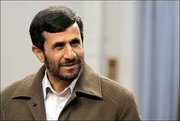THE commonly accepted meaning of jihad is religious Holy war against unbelievers in the mission of Allah and his Prophet Muhammad. The term conjures up images of bearded clerics, frenzied fundamentalists, insane suicide bombers, and remorseless turbaned crowds who chant death for the infidels.
These images derive from the religo-political interpretation of the term jihad. Jihad in this sense is perceived as a strategy for the attainment of `certain' political goals.
In the literal sense of the term, jihad means, `an effort, or a striving'. Islamic scholars say that the Quran and Hadith ascribe two meanings to the term: al-Jihad al-Akbar or ``the greater warfare'' which is against one's own demons; and al-Jihad al-Asghar, or the ``lesser warfare'' against infidels.
The perception of jihad in the former sense is subjective and has moral implications. It involves a way of life in which fleeting temptations have no place. Individuals become discerning subjects who comprehend that worldly temptations are ephemeral and have to be fought. It is also the ability to suffer virtuously the afflictions caused by the foe by following the commandments of Allah and to preach, through education, art and literature, the precepts of Islam, the religion of Allah.
The second meaning of jihad is the religious war against `oppressive occupiers' of the homeland of Islam,Dar al-Islam.
An Islamic scholar, Syed Qutb, observes that this homeland is not symbolised by borders but by a community that accepts Shari'a as the law. This jihad is a defensive act; it is a war of last resort dictated by circumstances and compulsions confronting Muslims. In this context, Syed Qutb states: ``Those who state that Islamic jihad was mainly for the defence of the `homeland of Islam' diminish the greatness of the Islamic way of life and consider it less important than their `homeland'.''
Qutb further says: ``The jihad of Islam is to secure complete freedom for every man throughout the world by releasing him from servitude... so that he may serve God.'' Another Islamic scholar, Al-Sayed Sabak analyses the two meanings of jihad and gives them historico-mythological context.
To begin with, Allah commanded his messenger, Prophet Muhammad, to wage ``jihad'' against the infidels of Mecca through Quran that answers difficult questions about life, sufferance, and abstaining from revenge and violence. During this period jihad connoted a struggle for self-purification of human beings by belief in the teachings of Allah and enduring the rigours involved in spreading the religion.
Forceful conversion to Islam was totally prohibited and peaceful struggle for the dissemination of Islamic ideas and ways took precedence. However, when the Prophet's adversaries stepped up the opposition against him and his followers in Mecca and Medina, Allah affirmed that the Muslims had to fight to defend themselves and their duty of advancing Islam.
In this context Jihad acquired a meaning other than the religious-moral one. It was a meaning that sanctioned transformation of Muslims into holy warriors (mujahid) to fight the war of God for the land of God. However, following the victory of the Muslims in the battle of Badr, the Prophet is said to have exhorted his followers to move away from war, as it would entangle them in the realm of lesser jihad.
Greater jihad and not the lesser one should be the goal of the believers, he said. Jihad in its militant, lesser sense is transient and contingent upon circumstances in which it is waged says Muhammad Said Ashmawi, a contemporary Islamic philosopher. The greater Jihad on the other hand is a continuous process that goes on even during the militant phase. In recent discourse, says Ashmawi, politics together with militant interpretation has replaced the notion of greater Jihad; they have presented a lopsided notion of the concept leading to distorted representations and stereotypes about Islam.
The rise of Islamic movements in the world that aspire for political power has invoked jihad in the militant sense of the term for political mobilisation.
Jihad has become a casual term for all acts of violence perpetuated by an Islamic group, individual or a regime. The understanding of the core concepts such as `homeland', `oppressive occupiers' and `jihad as a defensive act' has become highly subjective and distorted. Such groups and individuals need to be reminded about the `Greater Jihad', which the prophet underscored and only through which all the Muslims and indeed all people on earth can find redemption. For the lay and the uninitiated Islam and jihad have become synonyms for violence and bloodshed. Such generalisations need to be countered not only for the sake of Muslim community, umma but also for the benefit of the entire humanity.
Sunday, October 07, 2007
Subscribe to:
Post Comments (Atom)



























4 comments:
from the TIMES OF INDIA
Hi Jim!
"dont give me recipes
invite me over for dinner"-
so what do you like for dinner?
You must know -
I'm not a good cook
and I don't like to speak about political matter.
Still are you eager?
No matter what sector of the Faith Industry your own particular silly demented religious order controls you by, all, with no exceptions, are clearly the main antagonistic cores from which human conflict erupts and has done since the beginning of time.
The blatant lies, threats, witchcraft and skulduggery of religions orders are to be condemned. Personally I am more inclined towards the benefits of the tooth fairy.
The set standards can only be scientific proof, which provides the truth.
Krystyna: Jim is more than likely to have you for dinner.
Post a Comment